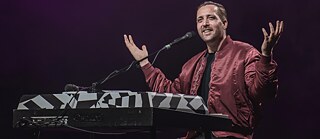After a stimulating evening with like-minded artists, Danger Dan is driven by a bold idea. He has no idea of the waves he’s about to make with his song Das ist alles von der Kunstfreiheit gedeckt.
Danger Dan can't sleep, his mind is racing. Dan and other artists have been heatedly discussing the scope of artistic freedom in Germany over cheese and wine. The evening was hosted by his former flatmate Jean Peters (Peng! Kollektiv), who lamented the fact that no-one today really exploits the legal grey areas of artistic freedom. Danger Dan can't stop thinking about what his friend has said – the idea for his song Das ist alles von der Kunstfreiheit gedeckt (This is all within the realms of artistic freedom) is born. Danger Dan, aka Daniel Pongratz, is a founding member of the German rap trio Antilopen Gang, which has been releasing albums since 2009 and has made a name for itself on the local music scene. With a penchant for provocation, the band is renowned for its socially critical, often sarcastic lyrics. Indeed, in 2014, Antilopen Gang had to defend their song Beate Zschäpe hört U2 (Beate Zschäpe listens to U2) in court – with a victorious outcome for the band.When Danger Dan starts penning lyrics inspired by Jean Peters in 2020, Germany is about to enter its first coronavirus lockdown. For some time now, Pongratz has been thinking of breaking with the familiar Antilopen Gang sound to embark on a solo album. Enforced isolation gives Danger Dan the opportunity he needs and he lets things take their course, composing 11 songs which he releases as a piano album in April 2021. Simultaneously, heated debates about the boundaries of free speech and censorship are raging across Germany. The political right and advocates of conspiracy theories are using freedom of expression as a weapon against perceived “political correctness”. “We’re entitled to our own opinion, aren’t we?” becomes the battle cry of so-called “Wutbürger”, or groups of “enraged citizens”. The mood in the country is charged. Fuelled by the debate, Danger Dan decides to release Das ist alles von der Kunstfreiheit gedeckt as the first single from his album, which comes out in March 2021.
Speaking hypothetically,
Suppose I wrote a song
Saying I personally considered
Jürgen Elsässer to be an anti-SemiteDanger Dan: Das ist alles von der Kunstfreiheit gedeckt
The song becomes a huge hit and instead of libel suits receives rapturous applause. Danger Dan has pulled off a brilliant stunt. He sees through the tactics of the right-wing scene and cleverly uses them as a weapon himself. In his lyrics, he denounces individuals who have recently cast racist or anti-Semitic slurs under the guise of free speech – but always points out that these are his personal opinions, therefore invoking his right to artistic freedom. The consequence is that Danger Dan cannot be sued for the content of his lyrics. His strategy of initially framing statements as hypothetical and later switching to the indicative mood garners both admiration and seething hatred.
Despite its commercial success, the song is the subject of fierce debate. Former AfD politician and member of the Bundestag, Frank Pasemann, submitted a petition to the government, criticising the fact that Danger Dan is receiving cultural funding from the state to – as he put it – “denigrate dissenters”, while the line “If you can’t fight violence peacefully, all we have left is militancy” kicked up a storm on public television. When the song aired live on Jan Böhmermann’s late-night ZDF show Magazin Royal for the first time, discussions raged backstage over whether this statement should be broadcast without detailed contextualisation. Despite, or perhaps because of, these controversies, the song became an instant hit, attracting over 14 million views on YouTube and three times as many streams on Spotify. This was followed by a flood of invitations for interviews, podcasts and television appearances, unexpectedly making Daniel Pongratz the man of the hour. The music industry had not anticipated such commercial success, and even Pongratz was surprised by the breakthrough, which is why he initially released only 500 copies of the album. They sold out instantly.
Danger Dan has achieved something truly remarkable. He’s taken radically formulated content and wrapped it in accessible, appealing packaging, successfully bringing left-wing critique into the mainstream and the educated middle-class. His clever manoeuvre has set new standards and reignited the discourse on freedom of expression in Germany. With unwavering conviction, he condemns what deserves condemnation in a democratic society. Then he raises a toast with “... a sparkling wine, because this is all within the realms of artistic freedom”.
May 2024
